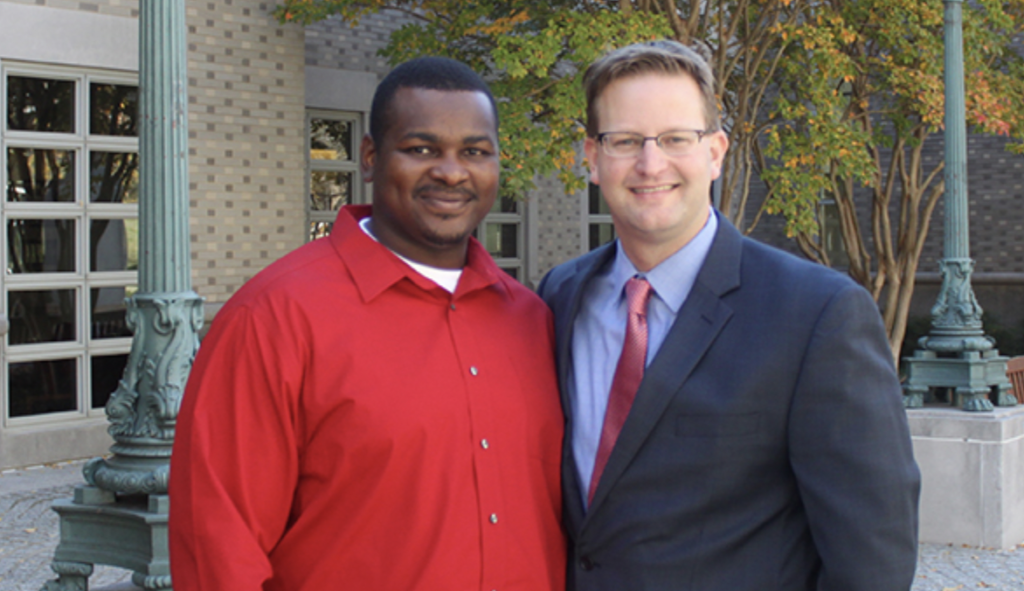MLK Teach In: Law School Alum Speaks on Freeing an Innocent Man from Death Row

Image Courtesy of The Catholic University of America
By Katherine Plunkett
On Tuesday, January 17 Campus Ministry hosted former law school alumnus Brian Stolarz as the keynote speaker for the MLK Teach In, which continues all week in honor of Martin Luther King Jr. Day. Stolarz was invited to discuss his work in helping an innocent man get off death row in 2015 and gifted the first twenty-five students with a signed copy of his book Grace and Justice on Death Row: The Race Against Time and Texas to Free An Innocent Man.
Stolarz graduated from the Columbus School of Law in 1998, which he discussed at the beginning of his talk, adding that he met his wife on a bench outside the building. He also served as a public defender in Brooklyn before he received a call to go to Texas and work pro bono for Alfred Dewanye Brown, who had been wrongfully sentenced to the death penalty. Upon first speaking to Brown, Stolarz stated that he knew he was innocent instantly.
Brown was convicted in 2005 of the murders of a police officer and a store clerk occurring alongside two other men despite having evidence of an alibi. Stolarz spent the first half of the talk detailing how he was convicted even when there was no evidence tying him to the case.
Stolarz also discussed Brown’s alibi, which was that he was at his girlfriend Ericka Dockery’s house and made a call to her workplace twice. The receptionist at the workplace saw the caller ID, which read that the call was coming from Dockery’s house. Dockery told this story before a grand jury and was arrested for perjury. She was told by the prosecutor that her kids would be taken by Child Protective Services and that she could even be given the death penalty if she did not change her story. After spending four months in prison, during which she lost her job, she testified in court that Brown was not at her house and called from somewhere else.
When discussing how the District Attorney wanted Brown’s conviction despite a lack of evidence and his alibi, Stolarz offered the following comment.
“It is a white police officer shooting and a black defendant. They wanted justice at all costs,” he said.
Not only was the story of his alibi altered during his trial to get his conviction, further information was changed to sentence him to death. In Texas, a person must have an IQ of at least 70 to receive the death penalty. Brown had an IQ of 68 and could not read and write, but “the state doctor gave Dewayne four extra [IQ] points,” Stolarz said. That would make his IQ 73 and able to qualify him for the death penalty.
Stolarz recounted his thirteen years working with Brown, who spent over twelve years in prison, ten of them being on death row. They developed a close friendship, with Stolarz showing the audience pictures of his children and Brown after his release. During his time working with Brown, Stolarz slowly compiled the evidence of his innocence, including affidavits from Dockery confirming his alibi and phone records confirming Brown’s call from Dockery’s house. It was the phone records, found in a box in a police officer’s home garage, that finally allowed Brown his retrial.
Brown’s retrial was granted seventeen months after Stolarz submitted the evidence due to it being an election year. The judges were up for reelection and would not touch the case until after they kept their seats.
“For political convenience he sat on death row for seventeen months with a piece of paper that said he didn’t do the damn crime,” Stolarz said.
In June 2015, Brown was finally released from prison. It would take even longer for him to be pronounced actually innocent, allowing him to receive compensation.
Brown’s release brought Stolarz much joy, and he stated how much he loves traveling to give talks about the case, which he referred to as “the case of my life.” But before Brown was exonerated, Stolarz mentioned that he would sometimes struggle with depression and anxiety and that it was faith and family that helped him through.
Towards the end of the talk, Stolarz linked his story to MLK week and offered his favorite quote from Martin Luther King Jr.: “injustice anywhere is a threat to justice everywhere.” He also shared a picture of him and Brown standing on the steps of the Lincoln Memorial in the spot where King delivered his “I Have a Dream” speech.
Stolarz discussed how this case is a reason to rethink the death penalty, tying his discussion into King’s stance on the death penalty. One of the reasons Brown was wrongfully convicted was the fact that his lawyer presented no evidence on his behalf.
“The system is broken unless it can give everyone the kind of counsel they deserve,” he said.
He also mentioned Brown’s feelings about his release, sharing a quote.
“I have no hate in my heart for what they did to me,” Brown said. “You can’t always trust everybody but you can always love them.”
More can be found about Brown and Stolarz’s story in episode eight of the docuseries Innocence Files (2020) on Netflix and in Stolarz’s book.






